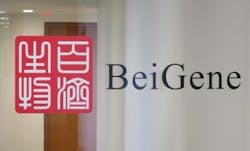The biopharma company that’s redefining ‘Made in China’
The words “Made in China” have long been synonymous with mass-produced, poor-quality goods that America, and the rest of the world, wants in large quantities at a low price.
One company in particular is poised to lead the charge in the biopharma market. Aptly called BeiGene, the company was founded in Beijing nine years ago and touts a portfolio specialized in immunotherapy and small molecule targeted therapies for cancer. They’re not the only game in town playing for these markets, of course, and they’re up against stiff competition with the likes of Merck’s Keytruda and Bristol-Myers Squibb’s Opdivo dominating the immuno-oncology field. But BeiGene is on the cusp of carving out its own niche in the market.
One of its targeted cancer treatments, a BTK inhibitor called zanubrutinib, is currently being studied in B-cell malignancies with two new drug applications (NDAs) under priority review by the Chinese regulatory authority. It’s being developed broadly in a number of trials, including a head-to-head trial against AbbVie and Janssen’s blockbuster BTK inhibitor Imbruvica. If the results come back in BeiGene’s favor, it will be the first time a drug developed in China produced trial results that were superior to a blockbuster already on the market.
And if BeiGene wins approval for zanubrutinib (the company plans to file its application to the FDA this year or early 2020), it will also mark the first U.S. approval of a homegrown Chinese drug.
Meanwhile, BeiGene is also making waves with its PD-1 checkpoint inhibitor, tislelizumab, that is being tested worldwide to treat several forms of cancer. In 2017, the company scored a major partnership deal with Celgene, where the latter acquired worldwide rights outside Asia to test tislelizumab in solid tumors. As part of the deal, BeiGene also took over Celgene’s commercial operations in China and won exclusive licensing rights to Celgene’s Chinese cancer portfolio.
Diana Francis
All victories aside, there are still challenges for multinational companies looking to break into China’s lucrative pharma market. As a leading player on that stage for nearly a decade, there are few companies better positioned to explain what it’s like to do business in China, what challenges companies are up against and what kind of innovative solutions have been proven to work.
Recently, we caught up with Diana Francis, Vice President and Global Head of Quality & Compliance for BeiGene, for more insights on the current landscape of Chinese manufacturing and opportunities in the biopharma field.
Meagan Parrish: Why has the Chinese government launched this initiative to boost its biopharma market?
Diana Francis: The Chinese government created the initiative called “Made in China,” which focuses on sectors where they want to make a difference. For years, a lot of multinationals went to China for manufacturing because of the lower costs. But now China wants to be a major player in all the different high-tech sectors.
China has invested in its infrastructure — for example, every city with over 60,000 people has rail service connecting them. And now for years, the country has been manufacturing a lot of its own drugs, including HIV treatments and birth control, all made with pharmaceutical ingredients that were made in China.
China has also been implementing regulatory changes and focusing on branding and product quality to be competitive on the global stage. They want to reduce their reliance on foreign technologies.
MP: What kinds of regulatory changes have been made to support the pharma industry?
DF: Because the regulatory landscape was quite difficult when it comes to getting a drug approved, companies became too discouraged to conduct clinical trials in China. Companies usually start in the U.S. and then they go to the EU, Japan or Latin America. But now Chinese regulators will accept foreign data for studies, provided that there is a correlation to the Chinese population. If you have subsets of Chinese patients in the study, they will analyze that to see how the data look.
The government is also creating science and technology centers, encouraging multinational companies to develop innovative drugs there. Clearly China wants to become the world’s largest producer of high-quality, innovative drugs.
These changes demonstrate the Chinese government’s strong commitment to patients. If you look at Merck, they had six new products approved in China in 2018 — that’s quite a few. And Celgene has three approved in China that we are marketing and distributing.
China wants to be competitive in the world market. They also want the supply chain well controlled and are encouraging multinational companies to do R&D there and be competitive with exports. That’s the key. They want to dominate domestically and produce for the world market, and they are willing to back it up with financial investments for companies that do business here.
MP: What makes the Chinese market attractive for foreign companies?
DF: China is the second largest economy in the world, it has the fastest growing upper-middle class who are very sophisticated. This population wants high-quality drugs, which is prompting a lot of companies to rethink their China strategy.
MP: What should companies consider when figuring out their China strategy?
DF: One issue is recruiting the right kind of talent. Our goal has been to build a quality system in China that is consistent with the international regulatory standards. Multinational companies like Pfizer, Merck, Novartis and AstraZeneca have been building their capabilities in China, creating a demand for top employees focused on quality and also fostering the development of a bigger workforce of people who understand global quality standards. We, of course, tap into this growing talent market for our own recruiting purposes as well.
It’s important to find people who have been exposed to international regulatory requirements, and who understand both domestic and international requirements.
MP: How does BeiGene ensure high quality standards?
DF: Our creative solution is that we have developed a single set of principles and standards. It’s a global quality management system that is managed regionally, but is complied to globally. At both our biologics site and small molecule site, we adhere to the same high standards.
We are also looking at state-of-the-art equipment and software. The software we use gives everyone access to a central system for archived data and all intellectual property is housed in one place. We are moving away from any paper-based system.
In addition, we are using the most advanced tech for our biopharma operations. Our bioreactors are all single use, so we don’t have to worry as much about contamination. We also have a modular system that is all contained as well as instruments and equipment that are state-of-the-art for reliable capsuling and packaging.
Our focus on quality comes all the way from the top. Company leadership firmly believe that quality is a key differentiator for us. Even though we manufacture in China, we won’t be part of the current stigma of “Made in China.”


